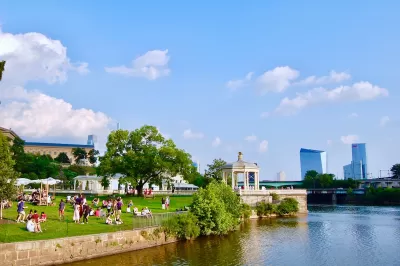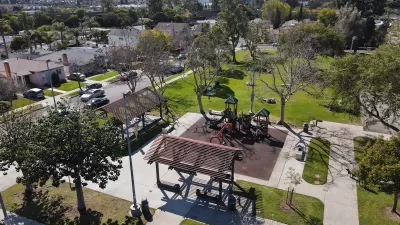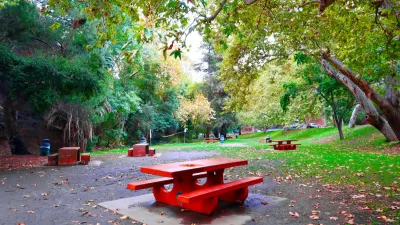Researchers used a machine learning algorithm to analyze over 200 parks in Philadelphia, revealing insights about differences in access to quality parks.

According to a new study from the University of Delaware, park access and quality vary across the city of Philadelphia. Using a machine learning algorithm to analyze 285 parks from over 100,000 park reviews gathered from Google Maps, the study shows that a majority of the parks that are considered to be of high quality are located in areas that are more likely have more affluent, white, and college educated residents. The parks that scored the lowest tend to be in areas where the residents are historically marginalized, including mostly low-income, Black and Latino, with a lower level of educational attainment.
As reported by Adam Thomas, the researchers corroborated the reviews with the physical characteristics of those parks using satellite and aerial imagery, as well as police reports and data from the Philadelphia Parks and Recreation Department. The study was published in Scientific Reports and was led by Matthew Walter, a doctoral student at the University of Delaware. Walter shared that by reading social media reviews of parks from 2011 to 2022 and by examining a large amount of reviews spread across a wide range of parks, he and his fellow researchers were able to see how a large population of Philadelphia was feeling about its urban parks.
Of particular concern to the researchers was that one key demographic group that lacked access to highly rated parks were the ones who needed them the most: young children. In the areas where the census data showed more young children, the park reviews were more likely to mention condition and safety when compared to other topics. This lower perceived park quality for young children raises a concern for childhood health and development.
FULL STORY: Study uses social media and machine learning to show environmental injustices in Philadelphia's urban parks

Alabama: Trump Terminates Settlements for Black Communities Harmed By Raw Sewage
Trump deemed the landmark civil rights agreement “illegal DEI and environmental justice policy.”

Planetizen Federal Action Tracker
A weekly monitor of how Trump’s orders and actions are impacting planners and planning in America.

The 120 Year Old Tiny Home Villages That Sheltered San Francisco’s Earthquake Refugees
More than a century ago, San Francisco mobilized to house thousands of residents displaced by the 1906 earthquake. Could their strategy offer a model for the present?

Opinion: California’s SB 79 Would Improve Housing Affordability and Transit Access
A proposed bill would legalize transit-oriented development statewide.

Record Temperatures Prompt Push for Environmental Justice Bills
Nevada legislators are proposing laws that would mandate heat mitigation measures to protect residents from the impacts of extreme heat.

Downtown Pittsburgh Set to Gain 1,300 New Housing Units
Pittsburgh’s office buildings, many of which date back to the early 20th century, are prime candidates for conversion to housing.
Urban Design for Planners 1: Software Tools
This six-course series explores essential urban design concepts using open source software and equips planners with the tools they need to participate fully in the urban design process.
Planning for Universal Design
Learn the tools for implementing Universal Design in planning regulations.
Clanton & Associates, Inc.
Jessamine County Fiscal Court
Institute for Housing and Urban Development Studies (IHS)
City of Grandview
Harvard GSD Executive Education
Toledo-Lucas County Plan Commissions
Salt Lake City
NYU Wagner Graduate School of Public Service





























